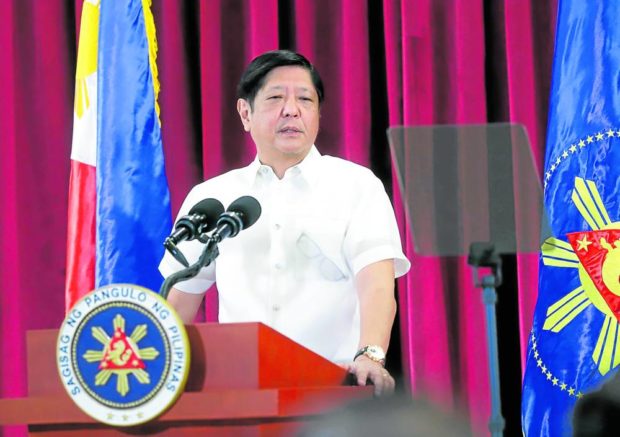MANILA, Philippines — President Ferdinand Marcos Jr. on Tuesday called on Filipinos to pay the right taxes and pay them on time, as he joined the Bureau of Internal Revenue (BIR) in launching the agency’s National Tax Campaign in Pasay City.
“I encourage the public to pay the correct amount of taxes on time to support the country’s economic recovery and expansion so critical in this time,” the president said in a speech at the Philippine International Convention Center.
He warned tax evaders that in 2022 alone 15 cases were filed before the Department of Justice (DOJ) over tax liabilities amounting to P5.1 billion, while 38 cases were filed with the Court of Tax Appeals involving a total of P5.32 billion.
He also cited the 74 complaints for tax evasion filed by the BIR before the DOJ last week.
Marcos called on the public to cooperate with government efforts to improve the tax collection system, assuring them of the proper utilization of public funds and that “every peso of taxes paid will become an investment in uplifting the quality of lives of every Juan and Juana.”
He also vowed to support BIR initiatives to digitize its systems and make the country more attractive to job-generating investments and institution-building.
Salceda bill
Speaking to reporters later at the BIR event, the president expressed his agreement with the bill filed by Albay Rep. Joey Salceda that raises the taxes on luxury goods to 25 percent.
“I believe it’s reasonable that we will tax the consumption side of those who are consuming luxury items,” he told reporters, adding that the tax on luxury goods in the country only covers “very specific items.”
In his view, the demand for luxury goods does not change “no matter what the situation.”
“For the rest of us, who are not necessarily consumers of luxury goods, we feel it when the economy goes down, but if you look, the luxury items, the fancy cars, the designer clothes and then the bags, everything, the price of that does not change because the buyers can afford it,” he said.
Salceda’s bill projects that raising the taxes on luxury items from 20 percent to 25 percent will result in about P15 billion in additional government revenues.
The proposal wants the higher tax rate applied to wristwatches, bags, wallets, and belts valued at more than P50,000; beverages worth more than P20,000 a liter; antiques valued at P100,000; and paintings valued at more than P1 million.
Thorny campaign issue
It also calls for a 25-percent luxury tax on automobiles valued at more than P10 million; private aircraft and parts except those for the use of the Philippine government, airlines, and logistics companies; and the sale of residential properties worth above P100 million.
Taxation was a hot-button subject that hounded Marcos while he was campaigning for the May 2022 presidential elections.
In 1997, the Supreme Court ruled that the family of the late former President Ferdinand Marcos Sr., the President’s father, owed P23 billion in estate tax. The amount had since ballooned to P203 billion due to nonpayment and interest, according to retired Supreme Court Justice Antonio Carpio.
According to the Presidential Commission on Good Government, the BIR had “already executed its final assessment” on the Marcos properties involved as early as 1993, and that “as early as 1997, the judgment on the tax case had become final and executory.”
In March last year, then-BIR Commissioner Caesar Dulay said the bureau had sent a written demand to the Marcos family in December 2021 for the tax payment.
In September, three months into his presidency, the President said he was willing to have the tax case reopened.
“Open the case and let us argue it so that all of the things that we should have been able to say in 1987, ’88, ’89 (the three years after the Marcos family was ousted from Malacanang and forced into exile) that we were not able to say, we can clarify the properties that they say belong to us,” Marcos said in an interview with TV host Toni Gonzaga.
In December, then newly appointed BIR commissioner Romeo Lumagui Jr. said he would ‘’study’’ the Marcos tax case.
